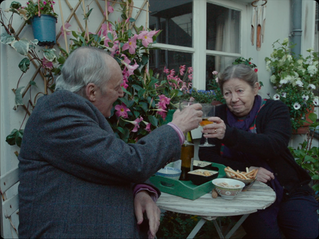Scenes from a Marriage
- Lauren Mattice
- Aug 4, 2021
- 2 min read
Ingmar Bergman, 1974

1974 saw Ingmar Bergman’s television series Scenes from a Marriage make its theatrical debut. Coincidentally, its release marked four years since the very public and emotional separation between Bergman and actress Liv Ullmann, who stars in the film alongside Erland Josephson. Ullmann and Bergman were both married when they fell in love, their tryst being one of the last for serial romantic Bergman, who proclaimed “I live many lives” to qualify his affairs. Shot partly on the island of Fårö, near the home in which Bergman and Ullmann’s relationship bloomed, Scenes from a Marriage is far from abstract, rather, it is a meditation on past romantic strife.
We enter the narrative ten years into the relationship of Marianne and Johan. Our arrival is timely. We see the couple undergo various trials and tribulations, many of which are gender-dependent. Marianne is subject to Johan’s lacerating indifference when he reveals his involvement with a younger woman, and further still to his tests of self-pity. Indeed, it is Johan’s constant battle with not-entirely-unconscious male inadequacy that determines Marianne as the reason for his failed career, their lapsing sex life, and, ultimately, his feigned indifference towards her.
Marianne placates her husband so that the relationship may stay solid: running the house, dieting and bringing the family together. But her tenderness with Johan vacillates with his intentions, pulling the relationship and her role in it into a trap. Piece by piece, Johan drains her of her strength.
Bergman’s characterization of Marianne as a divorce lawyer is deliberately at odds with her lack of agency; she vicariously experiences her clients’ failed relationships in a disturbing, cyclical fashion, adjacent to her own.
Only Bergman and Ullmann could know the similarities of their relationship to Marianne and Johan’s. And yet, Ullmann’s mastery of character gives overwhelming truth to the screen. In one moment, she is complacent with Johan’s desires and fulfilling her role as the dutiful wife. In the next, as she’s pushed to a point of such emotional turmoil, rebuking Johan and his behaviour, she emanates radiant authenticity.
It is Ullmann’s screen presence that begets her authority; her performance yields to the imposing cinema verité documentation of Marianne and Johan’s demise. Only once they are both remarried and kindling an affair together do their defences crumble, and it is only then that Bergman’s somewhat tenuous optimism shines through.
During their last meeting on screen, Marianne wonders if she has ever actually loved someone, to which Johan says yes, claiming their love was reciprocally felt during their original marriage. And yet, Johan’s reassurance brings us back to square one. We feel Marianne’s anguish at each strike of Johan’s insecurity. Ullmann’s demeanor in this scene does not grant her the romantic agency she is owed. It instead suggests that while hope may exist in Bergman’s narrative, male envy and egotism will resume and surround Marianne; they will continue to tear her down.








Comments